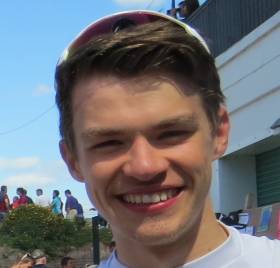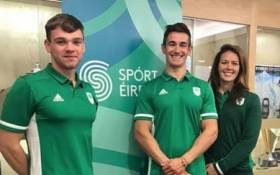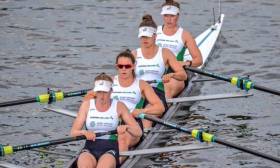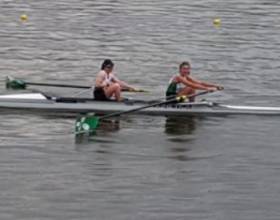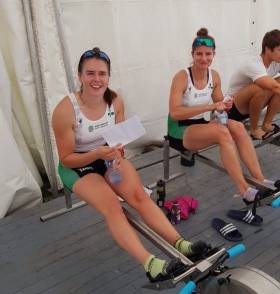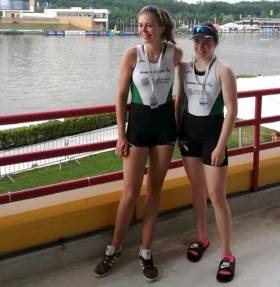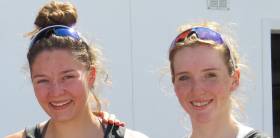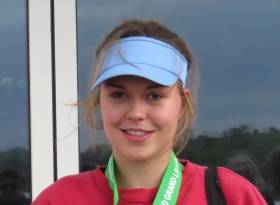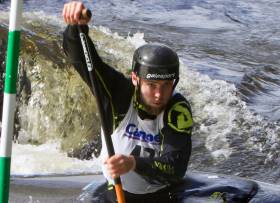Displaying items by tag: Ireland
#Rowing: Paul O’Donovan will team up with Fintan McCarthy in the lightweight double at the World Cup Regatta in Rotterdam, the Netherlands, from July 12th to 14th. Gary O’Donovan and Jake McCarthy will compete in lightweight singles.
World and European champion Sanita Puspure will hope to continue her winning run in the single. Monika Dukarska and Aileen Crowley form a pair and Denise Walsh and Lydia Heaphy will compete again in the lightweight double, as will Ronan Byrne and Philip Doyle in the men’s openweight double.
Ireland Crews for World Rowing Cup Three, Rotterdam, July 12th to 14th
Men
Double: R Byrne, P Doyle
Lightweight Double: F McCarthy, P O’Donovan
Lightweight Singles: G O’Donovan; J McCarthy
Women
Pair: M Dukarska, A Crowley
Single: S Puspure
Lightweight Double: D Walsh, L Heaphy
Jenny Egan Qualifies for Second B Final at European Games
#Canoeing: Jenny Egan qualified for the B Final of the K1 200 metres at the European Games in Minsk. The Ireland paddler took seventh in her semi-final. “I’m really happy to make the B Final in the K1 200m, it’s a big improvement from a few weeks ago at the World Cups. It was a good race, it was quite windy out there, quite a side wind so you had to adjust your technique to cope with the conditions. But I’m happy with it and through to the B Final of the 200 tomorrow,” Egan said.
She has also qualified for the B Final of the K1 500 and will compete in the final of the K1 5,000m.
Ronan Foley was eighth in his K1 200m semi-final and missed out on a place in the finals. He is set to race in the K1 5,000m on Thursday.
Ireland Four To Compete in B Final at World Cup Rowing
#Rowing: The Ireland women’s four are set for a B Final on Sunday after finishing sixth in their semi-final at the World Cup Regatta in Poznan. Australia beat the United States One crew after an exciting contest in this semi-final, with China producing good finish speed to take third – and a place in the A Final – from New Zealand.
Ireland’s crew of Tara Hanlon, Monika Dukarska, Aileen Crowley and Emily Hegarty were fifth at halfway, over a length off the top-four, and finished behind Britain Two, who took fifth.
World Cup Regatta, Poznan, Poland – Day Two (Irish interest)
Women
Four – Semi-Final One (First Three to A Final; rest to B Final): 1 Australia 6:54.54, 2 United States One 6:55.52, 3 China 6:55.87; 6 Ireland (T Hanlon, M Dukarska, A Crowley, E Hegarty) 7:08.16.
Pair – Semi-Final One (First Three to A Final; rest to B Final): 1 New Zealand 7:32.18, 2 Italy One 7:35.99, 3 China One 7:36.43; 6 Ireland (C Feerick, E Lambe) 7:51.17.
#Rowing: Ireland’s Eimear Lambe and Claire Feerick took sixth place in their semi-final of the women’s pair at the World Cup in Poznan, Poland, this morning. They will take a place in the B Final.
New Zealand’s Kerri Gowler and Grace Prendergast, who hold the world’s best time, took control early on and won well. China One took second and Italy One beat the United States Two to the crucial third place, and qualification for the A Final.
World Cup Regatta, Poznan, Poland – Day Two (Irish interest)
Women
Pair – Semi-Final One (First Three to A Final; rest to B Final): 1 New Zealand 7:32.18, 2 Italy One 7:35.99, 3 China One 7:36.43; 6 Ireland (C Feerick, E Lambe) 7:51.17.
Ireland Women's Four Finish Well and Nail Semi-Final Place
#Rowing: Ireland’s women’s four joined the women’s pair in the semi-finals of the World Cup regatta in Poland. The top three crews from the fours repechage qualified, but Ireland sat fifth at halfway. Canada moved away and opened a small lead; Ireland sat fourth with 500 metres to go. Croatia, Ireland and Britain Two finished best to take the top three places.
World Cup Regatta, Poznan, Poland, Day One (Irish interest)
Women
Four
Heat One (First Three to A/B Semi-Finals; rest to Repechage): 1 Australia 6:32.50, 2 United States Two 6:33.57, 3 Britain 6:35.69; 4 Ireland (T Hanlon, M Dukarska, A Crowley, E Hegarty) 6:38.44. Repechage (First Three to A/B Semi-Final; rest to C Final):
1 Croatia 6:47.12, 2 Ireland 6:47.49, 3 Britain Two 6:48.19.
Pair
Heat Two (Winner to A/B Semi-Final; rest to Repechages): 1 Italy Two 7:07.10; 2 China Two 7:09.55, 3 Ireland (E Lambe, C Feerick) 7:10.31. Repechage One (First Two to A/B Semi-Final; next two to C Final; rest to D Final): 1 United States One 7:15.35, 2 Ireland 7:19.33; 3 Canada One 7:26.52.
#Rowing: Ireland’s women’s pair of Claire Feerick and Eimear Lambe qualified for the semi-final at the World Cup Regatta in Poznan, Poland. The young crew took a clear second place behind Megan Kalmoe and Tracey Eisser of the United States in their repechage. The USA One crew were clear winners, while Feerick and Lambe did well to win a battle with Canada One to claim the second – and final – qualifying spot.
World Cup Regatta, Poznan, Poland, Day One (Irish interest)
Women
Four
Heat One (First Three to A/B Semi-Finals; rest to Repechage): 1 Australia 6:32.50, 2 United States Two 6:33.57, 3 Britain 6:35.69; 4 Ireland (T Hanlon, M Dukarska, A Crowley, E Hegarty) 6:38.44.
Pair
Heat Two (Winner to A/B Semi-Final; rest to Repechages): 1 Italy Two 7:07.10; 2 China Two 7:09.55, 3 Ireland (E Lambe, C Feerick) 7:10.31. Repechage One (First Two to A/B Semi-Final; next two to C Final; rest to D Final): 1 United States One 7:15.35, 2 Ireland 7:19.33; 3 Canada One 7:26.52.
Ireland Four Bound for World Cup Repechage in Poznan
#Rowing: The Ireland women’s four took fourth in their heat, missing out on direct qualification for the semi-final, at the World Cup Regatta in Poland this morning. The crew of Tara Hanlon, Monika Dukarska, Aileen Crowley and Emily Hegarty will compete in a repechage later today.
Australia and the United States Two fought it out for the win, with Australia taking top spot. Ireland and Britain battled for the third and final qualification spot, which Britain took.
World Cup Regatta, Poznan, Poland, Day One (Irish interest)
Women
Four
Heat One (First Three to A/B Semi-Finals; rest to Repechages): 1 Australia 6:32.50, 2 United States Two 6:33.57, 3 Britain 6:35.69; 4 Ireland (T Hanlon, M Dukarska, A Crowley, E Hegarty) 6:38.44.
Pair
Heat Two (Winner to A/B Semi-Final; rest to Repechages): 1 Italy Two 7:07.10; 2 China Two 7:09.55, 3 Ireland (E Lambe, C Feerick) 7:10.31.
#Rowing: Ireland’s Claire Feerick and Eimear Lambe finished third in their heat of the women’s pair at the World Cup Regatta in Poznan in Poland this morning.
To qualify directly for the semi-finals, the Ireland crew would have had to win this heat and Feerick and Lambe were at or near the head of the field throughout the race. They were marginal leaders through the 1,000 metres and the 1500 metres, after which China Two took over. Italy Two passed them coming up to the line to take top spot.
Feerick and Lambe will compete in a repechage with the aim of taking this route to the A/B semi-finals.
World Cup Regatta, Poznan, Poland, Day One (Irish interest)
Women
Pair
Heat Two (Winner to A/B Semi-Final; rest to Repechages): 1 Italy Two 7:07.10; 2 China Two 7:09.55, 3 Ireland (E Lambe, C Feerick) 7:10.31.
Ireland Paddler Jegou Four Places off Final at World Cup
#Canoeing: Liam Jegou put in a solid performance at the canoe slalom World Cup in Lee Valley today. The Ireland C1 paddler had a fault-free run and took 14th of the 30 competitors in the semi-final, missing out on a top-10 place by 2.4 seconds. His placing put him 10th of the competing nations – the top 11 nations at the World Championships in September will qualify a boat for the Olympic Games.
Canoe Slalom World Cup, Lee Valley, London (Irish interest)
Men
C1 – Semi-Final (First 10 to Final): 14 Ireland (L Jegou) 101.15 seconds.
Jegou Takes Place in Semi-Final at Lee Valley World Cup
#Canoeing: Liam Jegou qualified for the semi-finals of the canoe slalom World Cup in Lee Valley in London today. He took ninth place in the second run, and will go off second of the 30 C1 competitors in the semi-finals on Saturday. The top 10 go through to the final.


























